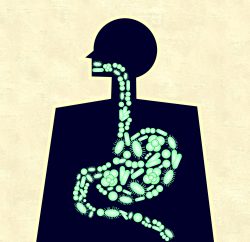 Some of us put on weight far more easily than others, and this may be related to our unique gut microbial compositions. Understanding how these microscopic organisms impact our health could help provide an explanation why some people seem unaffected by indulgent eating habits. A team at the Copenhagen University has uncovered a connection between weight gain and gut microbe composition. It appears some individuals may have an advantage in getting greater energy from food than those with less efficient microbes. This breakthrough research could explain why people sometimes struggle to achieve similar results despite eating identical meals.
Some of us put on weight far more easily than others, and this may be related to our unique gut microbial compositions. Understanding how these microscopic organisms impact our health could help provide an explanation why some people seem unaffected by indulgent eating habits. A team at the Copenhagen University has uncovered a connection between weight gain and gut microbe composition. It appears some individuals may have an advantage in getting greater energy from food than those with less efficient microbes. This breakthrough research could explain why people sometimes struggle to achieve similar results despite eating identical meals.
Researchers studied the efficiency of gut microbes in energy extraction from food. Out of 85 participants studied, 40% had more efficient gut microbiota, which allowed them to extract more energy from their meals than the rest of their peers. They were found to have a so-called B-type composition, dominated by Bacteroides bacteria. These may be more proficient at energy extraction, resulting in an intake higher than necessary for optimal health and well being.
This research has uncovered a clue to help explain varying rates of weight gain due to the composition of gut microbes. It appears that those with different compositions could be prone to gaining more or less than others, despite similar eating habits or exercise levels. This breakthrough provides us new insights into understanding how our bodies store fat and maintain healthy weights.
The researchers also investigated how long it took for food to move from mouth to excretion by taking a simulated voyage through the body. Their findings resulted in an unexpected outcome – those with shorter travel times reaped more nutrients than their counterparts who had longer digestive trails. Remarkably, this nutrient-rich highway spanned only 12–36 hours yet proved essential in unlocking important vitamins and minerals our bodies need.
The researchers have made an interesting discovery that some individuals may be receiving extra calories from the same amount of food eaten, thanks to their highly efficient gut bacteria. Our gut bacteria have a remarkable ability to extract additional energy from the food we eat. This often occurs in the form of short-chain fatty acids, which can be used by our bodies as fueling sources for metabolic function. However, if an excess is ingested, it could increase one’s risk of obesity over time.
This new study with humans confirms previous studies in mice – that gut bacteria taken from an obese donor can cause greater weight gain, even with the same diet. Researchers suggest this is because these microbes are more efficient at extracting energy from food they consume. It appears our microbiome could play a pivotal role in how we manage our weight.
To view the original scientific study click below:
Stool energy density is positively correlated to intestinal transit time and related to microbial enterotypes





